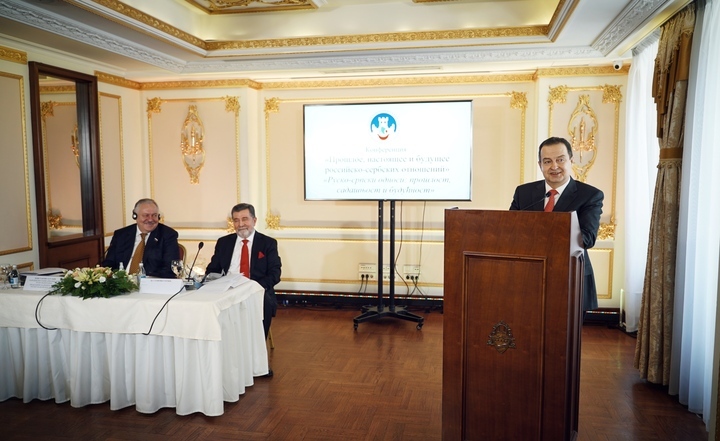The official opening ceremony of the Russian Balkan Center took place in Belgrade on April 29.
The event, organized at the Moscow Hotel in the center of the Serbian capital, was opened by the conference “Past, Present and Future of Russian-Serbian Relations”.
It was attended by Russian Ambassador to Serbia Alexander Botan-Kharchenko, Speaker of the Parliament of the Republic Ivica Dacic, State Secretary of the Serbian Foreign Ministry Nemanja Starovich, Director of the Russian Railways International branch in the country Mansurbek Sultanov.
"Expansion of multidimensional ties"
Russian Foreign Minister Sergei Lavrov sent a welcome letter to the conference participants, in which he expressed his conviction that the center would contribute to "expanding the multifaceted Russian-Serbian ties."
Aleksandr Botan-Kharchenko, for his part, expects that "the reports and analysts of this center will reflect the failure of a number of attempts to present Serbia with a choice: Russia or the West, the EU."
He stated this during the conference.
Speaker of the Serbian Parliament Ivica Dacic
© Sergey Belous
In his speech at the event, Ivica Dacic stressed that Russian-Serbian relations are at their historical peak and noted the importance of opening such an organization in Belgrade.
“We needed a similar modern scientific center, with expert staff.
International relations are changing at the speed of light, and you need to know a lot, understand this and predict their possible changes, ”said the Speaker of the Serbian Parliament.
“Nations that have the potential to predict the direction of a changing world and respond correctly to these changes can look forward to further development.
And this is how I see your role, especially those who recognize the directions for more fruitful cooperation between Serbia and Russia, as well as our common response to the growing global challenges, ”Dacic emphasized.
According to him, Serbia will never join the sanctions against Russia, not only because it would "trample" the friendship of the two countries, but also because it would harm the interests of Belgrade.
“I can’t even imagine where Serbia and Kosovo and Metohija would have ended up today if we didn’t have the support of Russia all these years,” Dacic said, promising to provide all-round support for the activities of the Russian Balkan Center.
In turn, the deputy of the State Duma of the Russian Federation Konstantin Zatulin, who heads the Board of Trustees of the Russian Balkan Center, stressed that the priority area of the organization is the development of dialogue between civil societies of Russia, Serbia and other countries of the Balkan region, the development of practical recommendations in order to strengthen Russian-Serbian relations.
Head of the Board of Trustees of the "Russian Balkan Center" Konstantin Zatulin
© Sergey Belous
The Russian parliamentarian also noted that an extremely important intellectual task of the Center is to present a vision of problems and prospects for their solution, which would allow states to “resist negative trends, approve a model of interaction for the sake of protecting ... national interests, peace and stability in the Balkans and the post-Soviet space. ".
He also called Russia and Serbia "the last oases of common sense and Christian philanthropy in Europe", which are criticized for pursuing an independent policy.
RT editor-in-chief Margarita Simonyan also took part in the conference.
In her speech, she mentioned the so-called new ethics, which is imposed on modern society by adherents of radical liberalism.
This "ethics" denies religion, destroys culture, hiding behind considerations of humanism, Simonyan noted.
And its imposition leads to infringement of freedom of speech in Western countries.
“We see that of all the great powers, it is Russia that can now become the guarantor of the preservation and development of the customary, truly humane, highly cultured and truly civilized world human ethics.
Only now, from large countries, we can defend our right to be a traditional society, ”stressed Simonyan.
According to her, they are also trying to involve Serbia in the “mad carousel of new ethics”.
In this regard, Margarita Simonyan expressed her readiness to help the Serbian people resist these phenomena.
Wide range of tasks
The Russian Balkan Center will be located in the legendary Moscow Hotel in Belgrade.
This building was built at the beginning of the twentieth century with funds from Russian enterprises operating in the Balkans - among them was the insurance company "Russia", the residence of which was the future hotel.
At present, according to the idea of the founders of the new organization, it should return to "Moscow" the status of the center of intellectual and business activity in Serbia, which this location possessed at the beginning of the last century.
The Russian Balkan Center will engage in a comprehensive study of the political, economic, social, cultural and religious processes taking place in Serbia and other countries of the Balkan region, as well as the scientific development of relevant projects with the assistance of Serbian and Balkan think tanks, foundations and public organizations.
The building of the hotel "Moscow" in Belgrade
globallookpress.com
© Robert B. Fishman / dpa
In addition, the mission of the new Center involves familiarizing the Serbian and Balkan professional community, as well as the general public, with the main trends in the development of the Russian Federation, its scientific achievements, the position of the Russian expert community and government agencies on European and world politics.
Feedback is also expected: the Russian Balkan Center will disseminate information in Russia about political, economic and cultural processes in Serbia and the countries of the region.
The center also intends to develop its own research projects, which will involve specialists from various fields.
In addition, it is planned to hold international conferences, round tables and open lectures with the participation of leading Russian, European and international experts.

